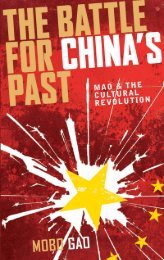Adam Smith's Critique of International Trading ... - Political Theory
Adam Smith's Critique of International Trading ... - Political Theory
Adam Smith's Critique of International Trading ... - Political Theory
Create successful ePaper yourself
Turn your PDF publications into a flip-book with our unique Google optimized e-Paper software.
Muthu / Smith’s <strong>Critique</strong> <strong>of</strong> <strong>International</strong> <strong>Trading</strong> Companies 205<br />
<strong>of</strong> moral equity and international justice, even in the context <strong>of</strong> a corrupt<br />
company-driven, mercantilist global economy. Smith’s hope was that<br />
Europe would become less powerful and that non-European nations would<br />
grow more powerful at Europe’s expence. 39 Perhaps as the inhabitants <strong>of</strong><br />
non-European countries grow stronger, or as “those <strong>of</strong> Europe . . . grow weaker,”<br />
the inhabitants <strong>of</strong> all the different quarters <strong>of</strong> the world may arrive at that<br />
equality <strong>of</strong> courage and force which, by inspiring mutual fear, can alone<br />
overawe the injustice <strong>of</strong> independent nations into some sort <strong>of</strong> respect for the<br />
rights <strong>of</strong> one another. (IV.vii.c.80; 626)<br />
In light <strong>of</strong> Smith’s own critique <strong>of</strong> the ravages <strong>of</strong> global commerce, how<br />
might the powerful countries <strong>of</strong> the world become less powerful, in his<br />
view, and how would non-European peoples and states attain sufficient<br />
power to stand alongside European states increasingly as equals, as entities<br />
that European nations would fear and whose rights would thus be (at least<br />
grudgingly) acknowledged and respected?<br />
In contrast to the hope that a contemporaneous thinker such as Diderot<br />
derived from his cyclical account <strong>of</strong> historical change, Smith did not assert<br />
that less powerful countries would naturally grow stronger and that the<br />
most powerful empires were bound to dissolve. Rather, Smith believed that<br />
the mutual communication that generally accompanies global commerce<br />
would help weak and vulnerable nations to withstand the forms <strong>of</strong> institutionalized<br />
power that had made global commerce for three centuries the<br />
source <strong>of</strong> such dismal injustices and cruelties, and would thereby help to<br />
bring about a greater equality <strong>of</strong> political circumstances. 40 As we have seen,<br />
the moral basis <strong>of</strong> Smith’s economic arguments is an understanding <strong>of</strong><br />
human liberty and <strong>of</strong> a basic right <strong>of</strong> all humanity to interact, communicate,<br />
and exchange with one another. The human ability to engage in such contact<br />
and communication, even in a limited fashion—limited in light <strong>of</strong> the<br />
oppression <strong>of</strong> coercive political and economic institutions such as the international<br />
trading companies <strong>of</strong> Smith’s day and their sovereign clients—will<br />
gradually foster an increasing equity <strong>of</strong> power, from which such institutions<br />
can be more effectively challenged.<br />
Nothing seems more likely to establish this equality <strong>of</strong> force than that mutual<br />
communication <strong>of</strong> knowledge and <strong>of</strong> all sorts <strong>of</strong> improvements which an<br />
extensive commerce from all countries to all countries naturally, or rather<br />
necessarily, carries along with it. (IV.vii.c.80; 627)<br />
Such a comment constitutes, among other things, an “enlightened” or progressive<br />
narrative <strong>of</strong> global commerce, although one rooted—as such
















